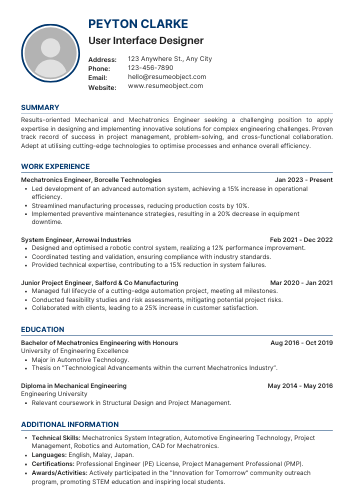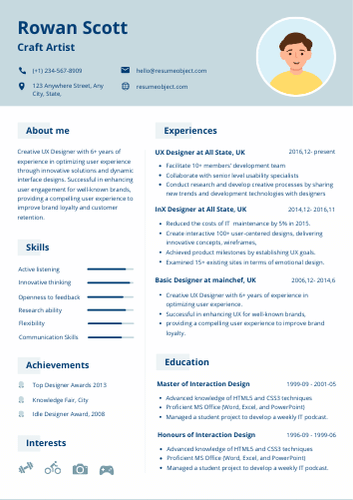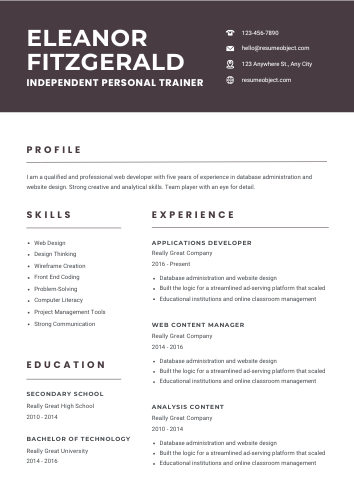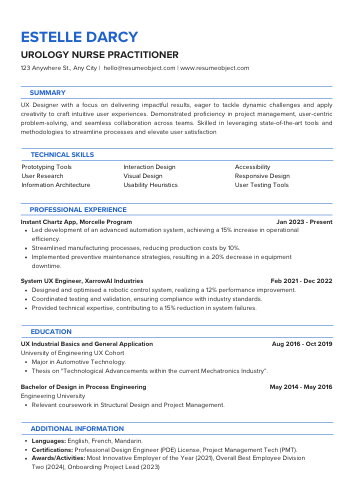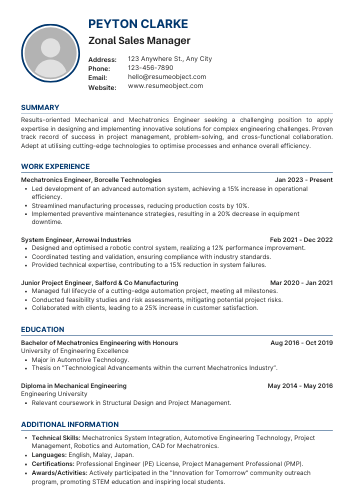Threat Intelligence Analyst Resume – Free Template, 30+ Examples
Threat Intelligence Analyst Resume
In today's digital landscape, a Threat Intelligence Analyst plays a crucial role in safeguarding organizations from cyber threats. Crafting a standout resume template is essential for showcasing your skills, experience, and knowledge in this competitive field.
A well-structured sample format can help you highlight your analytical abilities and technical expertise effectively. By focusing on relevant keywords and accomplishments, you can create a compelling resume that captures the attention of hiring managers in the cybersecurity industry.
Threat Intelligence Analyst Resume Objective Statement Examples
Explore effective resume objective examples for Threat Intelligence Analysts, showcasing skills in cybersecurity, data analysis, and threat assessment to capture employer interest and highlight your expertise in protecting digital assets.
-
Detail-oriented Threat Intelligence Analyst with 5+ years of experience in identifying and mitigating cyber threats, seeking to leverage expertise in a dynamic cybersecurity team to enhance organizational security posture.
-
Results-driven professional aiming to utilize advanced analytical skills and threat modeling techniques to proactively identify vulnerabilities and improve incident response strategies within a forward-thinking organization.
-
Passionate about cybersecurity with a strong background in threat analysis and risk assessment, eager to contribute to a collaborative team environment by providing actionable intelligence and fostering proactive threat mitigation.
-
Dedicated Threat Intelligence Analyst with a proven track record in leveraging open-source intelligence and advanced analytical tools to support decision-making processes, looking to drive strategic initiatives in a leading cybersecurity firm.
-
Motivated and technically proficient analyst seeking to apply extensive knowledge of emerging threats and security trends to develop comprehensive threat intelligence reports that inform and guide executive-level decisions.
For a standout career in airport management, explore our comprehensive Airport Director Resume guide, designed to showcase your skills and experience effectively to potential employers in the aviation industry.
Example Summary for Threat Intelligence Analyst Resume
This section provides a concise example of a resume summary tailored for a Threat Intelligence Analyst, highlighting key skills, experiences, and qualifications that attract potential employers in the cybersecurity field.
Detail-oriented and analytical recent graduate with a strong foundation in cybersecurity and threat intelligence. Proficient in identifying and analyzing potential security threats, with hands-on experience in data analysis and incident response. Eager to leverage academic knowledge and internship experience to contribute to a dynamic security team. Strong communication skills, with a passion for staying updated on the latest cybersecurity trends and technologies. Committed to enhancing organizational security through proactive threat assessment and strategic intelligence reporting.
Detail-oriented Threat Intelligence Analyst with over 5 years of experience in cybersecurity and threat assessment. Proven track record of analyzing complex data to identify potential threats and vulnerabilities, implementing effective strategies to mitigate risks, and enhancing organizational security posture. Strong skills in threat hunting, incident response, and collaboration with cross-functional teams. Adept at utilizing advanced analytical tools and methodologies to provide actionable intelligence and support decision-making processes. Committed to continuous learning and staying ahead of emerging threats in the cybersecurity landscape.
Results-driven Threat Intelligence Analyst with over 10 years of experience in cybersecurity and threat management. Proven expertise in identifying, analyzing, and mitigating threats to safeguard organizational assets. Adept at leveraging advanced analytical tools and techniques to produce actionable intelligence that informs strategic decision-making. Strong background in collaborating with cross-functional teams to enhance security posture and respond to emerging threats. Committed to continuous learning and staying ahead of evolving cyber threats to protect sensitive information and ensure business continuity.
Similar Resumes
Key Job Duties & Responsibilities of Threat Intelligence Analyst
A Threat Intelligence Analyst conducts in-depth research and analysis to identify, assess, and mitigate cybersecurity threats, ensuring organizational security through proactive monitoring and strategic reporting of emerging risks.
-
Collect and Analyze Threat Data: Gather and assess information from various sources, including open-source intelligence, dark web monitoring, and internal security logs to identify potential threats.
-
Monitor Cyber Threat Landscape: Stay updated on the latest cyber threats, vulnerabilities, and attack vectors to understand emerging risks and trends affecting the organization.
-
Develop Threat Intelligence Reports: Create detailed reports that summarize findings, highlight potential risks, and provide actionable recommendations for enhancing security posture.
-
Collaborate with Security Teams: Work closely with incident response, security operations, and other IT teams to share intelligence and support the development of proactive security measures.
-
Conduct Threat Assessments: Evaluate the likelihood and potential impact of identified threats on the organization, prioritizing them based on risk levels.
-
Implement Threat Intelligence Tools: Utilize advanced tools and technologies for threat detection, analysis, and reporting, ensuring effective operational capabilities.
-
Provide Training and Awareness: Educate staff on cybersecurity threats and best practices, fostering a culture of security awareness across the organization.
-
Participate in Incident Response: Assist in responding to security incidents by providing relevant intelligence and contributing to post-incident analysis and reporting.
-
Engage with External Partners: Collaborate with industry peers, government agencies, and information-sharing organizations to exchange threat intelligence and enhance collective security efforts.
-
Maintain Documentation: Ensure thorough documentation of threat intelligence processes, findings, and methodologies to support ongoing improvement and compliance efforts.
Important Sections to Add in Threat Intelligence Analyst Resume
A Threat Intelligence Analyst resume should include key sections such as a strong summary, relevant skills, professional experience, certifications, and education, showcasing expertise in cybersecurity, analysis, and threat detection to attract potential employers.
-
Contact Information: Include your full name, phone number, email address, and LinkedIn profile. Ensure that this information is up-to-date and professional.
-
Professional Summary: A concise summary that highlights your key skills, experience, and career objectives. Tailor it to the threat intelligence field to grab the employer's attention.
-
Technical Skills: List relevant tools and technologies, such as SIEM, threat detection systems, malware analysis tools, and programming languages (e.g., Python, SQL). This section should demonstrate your technical proficiency.
-
Certifications: Include any relevant certifications, such as Certified Information Systems Security Professional (CISSP), Certified Information Security Manager (CISM), or GIAC Cyber Threat Intelligence (GCTI). These validate your expertise and commitment to the field.
-
Professional Experience: Detail your work history, focusing on roles related to threat intelligence. Use bullet points to describe your responsibilities and accomplishments, emphasizing your impact on security posture and threat mitigation.
-
Education: List your degrees, including the institution, degree type, and graduation date. If you have relevant coursework or projects, include those to showcase your academic background.
-
Projects: Highlight any significant projects you've worked on, especially those that demonstrate your analytical skills, research capabilities, or contributions to threat intelligence.
-
Publications and Presentations: If applicable, include any articles, papers, or presentations you've authored or contributed to in the field of cybersecurity or threat intelligence.
-
Professional Affiliations: Mention memberships in relevant organizations, such as the Information Systems Security Association (ISSA) or the International Association for Counterterrorism and Security Professionals (IACSP), to show your engagement with the industry.
Required Skills for Threat Intelligence Analyst Resume
When crafting your Threat Intelligence Analyst resume, highlight skills that showcase your analytical abilities, technical expertise, and communication strengths. These qualities are essential for effectively identifying threats and conveying critical information to your team.
- Cybersecurity Fundamentals
- Threat Hunting
- Malware Analysis
- Incident Response
- Risk Assessment
- Vulnerability Management
- Network Security
- Data Analysis
- Intelligence Reporting
- OSINT (Open Source Intelligence)
- SIEM (Security Information and Event Management)
- Threat Modeling
- Communication Skills
- Programming/Scripting (Python, PowerShell)
- Knowledge of Security Frameworks (NIST, MITRE ATT&CK)
Action Verbs to Use in Threat Intelligence Analyst Resume
Incorporating strong action verbs in your Threat Intelligence Analyst resume enhances impact, showcasing your skills and achievements effectively. These dynamic words convey your expertise, drive, and ability to contribute meaningfully to cybersecurity initiatives.
- Analyzed
- Detected
- Investigated
- Mitigated
- Monitored
- Researched
- Reported
- Evaluated
- Collaborated
- Developed
- Implemented
- Responded
- Assessed
- Identified
- Communicated
Entry-Level Threat Intelligence Analyst Resume Sample
Looking to kickstart your career in cybersecurity? Check out this sample entry-level Threat Intelligence Analyst resume, designed to showcase your skills, education, and passion for protecting organizations from cyber threats. Let’s get you noticed!
Sample Resume #1
Name
[Your Name]
[Your Address]
[City, State, Zip]
[Your Phone Number]
[Your Email]
[LinkedIn Profile URL]
Objective
Detail-oriented and motivated recent graduate with a strong foundation in cybersecurity principles and threat intelligence analysis. Seeking an entry-level Threat Intelligence Analyst position to leverage analytical skills and contribute to organizational security efforts.
Education
Bachelor of Science in Cybersecurity
[Your University], [City, State]
[Month, Year] - [Month, Year]
- Relevant Coursework: Cyber Threat Intelligence, Network Security, Incident Response, Digital Forensics
- GPA: [Your GPA]
Certifications
- CompTIA Security+
- Certified Ethical Hacker (CEH) - [Month, Year] (if applicable)
- [Any other relevant certification]
Technical Skills
- Threat Intelligence Platforms: [Name specific tools, e.g., MISP, ThreatConnect]
- Programming Languages: Python, SQL
- Security Tools: Wireshark, Snort, Nessus
- Operating Systems: Windows, Linux
- Familiarity with MITRE ATT&CK Framework
Experience
Intern, Cybersecurity Analyst
[Company Name], [City, State]
[Month, Year] - [Month, Year]
- Assisted in monitoring network traffic for unusual activities and potential threats.
- Conducted research on emerging threats and vulnerabilities to support the threat intelligence team.
- Collaborated with senior analysts to create reports on threat landscape and trends.
IT Support Intern
[Company Name], [City, State]
[Month, Year] - [Month, Year]
- Provided technical support to end-users, resolving hardware and software issues.
- Assisted in maintaining network security protocols and user access controls.
- Documented incidents and solutions in the ticketing system.
Projects
- Developed a threat intelligence report on recent ransomware attacks, analyzing tactics, techniques, and procedures (TTPs) used by threat actors.
- Created a Python script to automate data collection from various threat intelligence feeds.
Professional Affiliations
- Member, Information Systems Security Association (ISSA)
- Member, [Any other relevant organization]
References
Available upon request.
Threat Intelligence Analyst Sample Resume (Mid-Level)
This sample mid-level Threat Intelligence Analyst resume showcases essential skills, experience, and qualifications, highlighting the candidate's ability to analyze threats, provide actionable insights, and enhance organizational security through effective intelligence strategies and collaboration.
Sample Resume #2
Contact Information
John Doe
123 Main Street
City, State, Zip
Email: [email protected]
Phone: (123) 456-7890
LinkedIn: linkedin.com/in/johndoe
Professional Summary
Detail-oriented and analytical Threat Intelligence Analyst with over 5 years of experience in cybersecurity and threat analysis. Proven track record in identifying, assessing, and mitigating risks to protect organizational assets. Adept at utilizing various intelligence tools and methodologies to enhance security posture and inform decision-making.
Skills
- Threat Intelligence Analysis
- Cybersecurity Frameworks (NIST, ISO 27001)
- Malware Analysis
- Incident Response
- Data Analysis & Visualization
- SIEM Tools (Splunk, ELK Stack)
- Programming Languages (Python, SQL)
- Risk Assessment
- Communication & Reporting
Professional Experience
Threat Intelligence Analyst
XYZ Cybersecurity Solutions, City, State
June 2020 – Present
- Conduct in-depth analysis of cyber threats, vulnerabilities, and incidents to inform risk management strategies.
- Collaborate with cross-functional teams to develop and implement threat intelligence programs.
- Create and present detailed reports on threat landscape trends and recommendations to senior management.
- Utilize SIEM tools to monitor and analyze security events, reducing incident response time by 30%.
Junior Threat Intelligence Analyst
ABC Tech Corporation, City, State
January 2018 – May 2020
- Assisted in the collection and analysis of threat data from various sources to identify potential risks.
- Supported incident response efforts by providing timely intelligence and actionable insights.
- Developed and maintained threat intelligence dashboards for real-time monitoring and reporting.
- Participated in threat hunting exercises, identifying and mitigating vulnerabilities in the network.
Education
Bachelor of Science in Cybersecurity
University of Technology, City, State
Graduated: May 2017
Certifications
- Certified Information Systems Security Professional (CISSP)
- Certified Ethical Hacker (CEH)
- GIAC Cyber Threat Intelligence (GCTI)
Professional Affiliations
- Member, Information Systems Security Association (ISSA)
- Member, Cyber Threat Intelligence Network (CTIN)
References
Available upon request.
Threat Intelligence Analyst Sample Resume for Experienced Level
Looking for a standout resume format for a Senior-Level Threat Intelligence Analyst? Discover how to showcase your expertise, skills, and accomplishments effectively, ensuring you grab the attention of hiring managers in the cybersecurity field.
Sample Resume #3
Contact Information
John Doe
123 Cyber St, Security City, ST 12345
(123) 456-7890
[email protected]
LinkedIn: linkedin.com/in/johndoe
Summary
Results-driven Threat Intelligence Analyst with over 8 years of experience in identifying, analyzing, and mitigating cyber threats. Proven track record in enhancing security posture through actionable intelligence and strategic recommendations. Adept at leveraging advanced analytical skills and threat intelligence tools to protect organizational assets.
Professional Experience
Senior Threat Intelligence Analyst
Cybersecurity Solutions Inc., Security City, ST
June 2019 – Present
- Lead a team of analysts in monitoring and responding to emerging cyber threats, resulting in a 30% reduction in incident response time.
- Develop and implement threat intelligence strategies that align with organizational goals, improving threat detection capabilities by 40%.
- Collaborate with cross-functional teams to integrate threat intelligence into security operations, enhancing overall security posture.
- Conduct in-depth analysis of threat actors, TTPs (Tactics, Techniques, and Procedures), and vulnerabilities to provide actionable insights to stakeholders.
- Present findings and recommendations to executive leadership, influencing strategic decision-making.
Threat Intelligence Analyst
TechSec Corp., Security City, ST
January 2016 – May 2019
- Analyzed threat data from multiple sources to identify trends and assess potential risks to the organization.
- Developed comprehensive threat reports that informed incident response and risk management strategies.
- Participated in red teaming exercises to evaluate the effectiveness of security measures and improve incident response protocols.
- Established strong relationships with external threat intelligence sharing communities to enhance intelligence capabilities.
Junior Threat Intelligence Analyst
SecureNet Solutions, Security City, ST
August 2014 – December 2015
- Assisted in the collection and analysis of threat intelligence data to support the organization's cybersecurity initiatives.
- Monitored threat intelligence feeds and reported on relevant threats, contributing to timely incident response efforts.
- Supported senior analysts in the development of threat assessments and vulnerability analyses.
Education
Bachelor of Science in Cybersecurity
University of Security, Security City, ST
Graduated: May 2014
Certifications
- Certified Information Systems Security Professional (CISSP)
- Certified Threat Intelligence Analyst (CTIA)
- GIAC Cyber Threat Intelligence (GCTI)
Skills
- Threat Intelligence Analysis
- Incident Response
- Vulnerability Assessment
- Risk Management
- Security Operations Center (SOC)
- Cybersecurity Frameworks (NIST, MITRE ATT&CK)
- Data Analysis Tools (Splunk, Maltego)
- Strong Communication and Presentation Skills
Professional Affiliations
- Member, Information Systems Security Association (ISSA)
- Member, Open Web Application Security Project (OWASP)
References
Available upon request.
Resume Tips That Work for Threat Intelligence Analyst Resume
Do
Do: Conduct thorough research on emerging threats to identify trends and patterns that could impact the organization’s security posture.
Do: Analyze and correlate threat data from various sources to provide actionable intelligence and support decision-making processes.
Do: Develop and maintain threat intelligence reports that summarize findings and provide insights to stakeholders for strategic planning.
Do: Collaborate with cross-functional teams to enhance overall security measures and ensure a unified approach to threat mitigation.
Do: Stay updated on industry developments and participate in professional networks to continually improve skills and knowledge in threat intelligence.
Don't
Don't: Include irrelevant work experience – Focus on positions and skills that directly relate to threat intelligence to keep your resume concise and targeted.
Don't: Use jargon excessively – Avoid overloading your resume with technical terms that may confuse hiring managers; clarity is key.
Don't: Neglect soft skills – Highlight your communication, teamwork, and analytical skills, as these are crucial in a collaborative threat intelligence environment.
Don't: Leave out measurable achievements – Quantify your contributions with specific metrics to demonstrate your impact and effectiveness in previous roles.
Don't: Ignore formatting – Ensure your resume is visually appealing and easy to read; a cluttered or disorganized layout can detract from your qualifications.
Threat Intelligence Analyst Sample Cover Letter
This sample cover letter for a Threat Intelligence Analyst showcases essential skills, experiences, and qualifications, effectively demonstrating the candidate's ability to enhance cybersecurity measures and contribute to organizational safety and resilience against emerging threats.
Dear [Hiring Manager's Name],
I am writing to express my interest in the Threat Intelligence Analyst position at [Company Name]. With a strong background in cybersecurity and extensive experience in analyzing and mitigating threats, I am excited about the opportunity to contribute to your team.
In my previous role at [Previous Company], I successfully identified and reported on emerging threats, leveraging my skills in data analysis and threat modeling. My ability to collaborate with cross-functional teams has enabled me to develop actionable intelligence that has significantly improved our security posture.
I am particularly impressed by [Company Name]'s commitment to innovation and proactive threat management. I am eager to bring my expertise in threat detection and incident response to your organization. My passion for continuous learning and staying updated on the latest trends in cybersecurity aligns perfectly with your team's goals.
Thank you for considering my application. I look forward to the opportunity to discuss how my skills can benefit [Company Name].
Sincerely,
[Your Name]
[Your Phone Number]
[Your Email Address]
FAQs about Threat Intelligence Analyst Resume
What key skills should be highlighted on a Threat Intelligence Analyst resume?
Highlight skills such as analytical thinking, cybersecurity knowledge, threat assessment, data analysis, and familiarity with intelligence frameworks. Proficiency in tools like SIEM, malware analysis, and programming languages (Python, SQL) is crucial. Additionally, emphasize communication skills for reporting findings and collaborating with teams effectively.
How can I effectively showcase my experience in threat analysis and reporting?
Highlight your relevant skills and accomplishments in threat analysis by detailing specific projects, methodologies used, and outcomes achieved. Include metrics to quantify your impact, such as reduced incident response times or improved threat detection rates. Tailor your resume to emphasize experience with tools and technologies pertinent to the role.
What certifications are beneficial for a Threat Intelligence Analyst resume?
Certifications such as Certified Information Systems Security Professional (CISSP), Certified Ethical Hacker (CEH), GIAC Cyber Threat Intelligence (GCTI), and CompTIA Cybersecurity Analyst (CySA+) are highly beneficial for a Threat Intelligence Analyst resume. These credentials demonstrate expertise in cybersecurity, threat analysis, and risk management, enhancing your employability in the field.
How should I format my resume to appeal to employers in the cybersecurity field?
To appeal to employers in the cybersecurity field, format your resume with a clean, professional layout. Use clear headings, bullet points for easy readability, and include relevant keywords. Highlight technical skills, certifications, and experience in threat intelligence, ensuring your accomplishments are quantifiable and tailored to the job description.
What are common keywords to include in a Threat Intelligence Analyst resume for applicant tracking systems?
Common keywords for a Threat Intelligence Analyst resume include "threat assessment," "cybersecurity," "malware analysis," "incident response," "vulnerability management," "data analysis," "risk assessment," "network security," "intelligence gathering," and "reporting." Incorporating these terms can enhance visibility in applicant tracking systems and improve chances of selection.
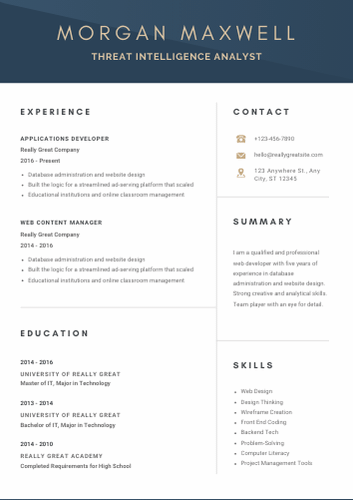
Threat Intelligence Analyst Resume
Objective
Detail-oriented Threat Intelligence Analyst with expertise in cybersecurity, data analysis, and risk assessment. Seeking to leverage strong analytical skills and proactive approach to enhance organizational security and mitigate threats effectively.
Summary/Description
Detail-oriented Threat Intelligence Analyst with expertise in cybersecurity, risk assessment, and data analysis. Proven track record in identifying threats, enhancing security protocols, and delivering actionable insights to mitigate risks effectively.
Top Required Skills
Cybersecurity Knowledge
Data Analysis
Threat Assessment
Communication Skills
Technical Proficiency
Mistakes to Avoid
Lack of specific technical skills and tools relevant to threat intelligence.
Failing to quantify achievements and impact in previous roles.
Using generic language instead of tailored keywords for the cybersecurity field.
Important Points to Add
Proficiency in threat analysis tools and methodologies
Strong understanding of cybersecurity frameworks and protocols
Experience in data collection, analysis, and reporting on threat trends
View More Templates
 Free Resume Templates
Free Resume Templates

